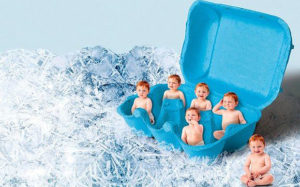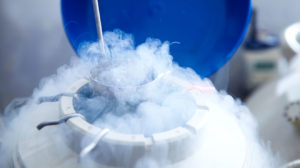Why Women are Choosing To Freeze Their Eggs
Increasingly, women are choosing to freeze their eggs with the intent of having them fertilized at a later date, once their life circumstances are more conducive to starting a family.
Interestingly, new research on the subject suggests that for the majority of these women the motivation for freezing their eggs is perfectly clear — and it isn’t career-related. Rather, it’s because they just haven’t found the right partner yet.

What the Studies Say
Over the course of the study interviews were conducted with 31 women, all who stated they were afraid that their time to become a mother was running short, concerned they might not find a suitable partner before their biological clock made conception impossible for them.
One aspect of the study focused on ten women, five in relationships and five who were single when they had their eggs were frozen. The women in relationships chose to undergo the procedure because they were unsure of how long their relationship would last or because it was relationship too new to arrive at an accurate determination.
The single women were all veterans of relationships that did not succeed. Freezing their eggs was an attempt to preserve their fertility.

Approximately two-thirds of the women said they didn’t want to enter into a relationship with a partner who didn’t want children, while another third stated they feared they would come to regret the decision of not freezing their eggs while they still could.
More than twenty per cent had health issues, which triggered their fears of a serious illness or premature menopause potentially interfering with their ability to conceive in the future. Most of the women confirmed that their careers had nothing to do with freezing their eggs.
Another recent study concerned 150 women located in Israel and the United States. Of these women, 85 per cent did not have partners. Those who did said their partner either didn’t want to have children or that their relationships were still too uncertain or new to properly determine if they’d be suitable fathers to their children.
Tremendous Growth in Egg Freezing Procedures
The technology to freeze eggs is relatively new. In 2013 there were only 5,000 such procedures performed in the United States, but this figure was expected to increase to 76,000 by 2018.
A doctor is not a substitute for the classic knight in shining armor. Despite this, many women in their thirties and forties are turning to doctors to have their eggs frozen.

Numerous studies have revealed women are not intentionally postponing having children so they can better focus on their careers. Rather, the research concludes that most women choose to freeze their eggs so they can have more time to find the right partner.
According to studies conducted at the University of Cambridge Centre and the London Women’s Clinic, the situation is essentially the same on both sides of the Atlantic.
More and more childless, successful, single women in their thirties and forties are visiting fertility clinics to learn more about their reproductive options.
The Three Main Categories of Women Seeking Oocyte Cryopreservation
There are basically three categories of women who pursue egg freezing procedures.
Falling in to the first category are those who are interested in donor sperm because they no longer believe they’ll ever find Mr. Right and are looking for information regarding their options. They’re generally well prepared, have done the research, and understand the financial and practical realities of single parenthood.
Their primary concern tends to be if it’s fair to bring a child into the world who will never have a father. They often feel trapped between childlessness and single motherhood.
The second type of woman is in her early thirties, proactively making plans for the future and considering having her eggs frozen. She is much better informed about the process than women who are five or ten years her senior.
This type of woman will have her eggs frozen at her biological prime, creating the best chance of conception in the future. If she eventually conceives naturally, she’ll know that at least all the money she spent on cryopreservation had put her mind at ease.

The third group is in their late thirties to early forties and the largest sector of women who seriously consider undergoing the procedure.
They are typically waiting for the right partner but realize they’re fast approaching a biological reproductive precipice. The majority of these women are successful, well-educated, cosmopolitan, and have worked and lived in numerous countries.
Some have recently been in relationships they’d hoped would lead to marriage and starting a family and have become frustrated by their seemingly limited options of ever finding a suitable partner.
What’s the Obvious Question
The most obvious question on their minds typically tends to be “what’s happened to all the good men?” Fortunately for these women, freezing their eggs affords them several more years to figure it out, and then hopefully settle down with one of them.
They really are out there, you just might need to keep looking before you find each other.
But once you do, by having frozen your eggs while you had the chance, the opportunity to start a family will remain a viable option for your new life together.
Hindsight is 20/20
At 42 and after being together 6 years, I finally remarried (I did wait on Mr. Right). We got started right away on trying to have a baby, but we knew that at my age we needed to act quickly, so we went straight to fertility treatments.
After several IUI’s and 3 failed IVF attempts (one resulting in a pregnancy and miscarriage), I have often wished I could go back in time and freeze my eggs at a younger age. I would’ve at least had a fighting chance with my own eggs.
Here’s what I did post IVF: My 3 Day Juice Cleanse – Detoxing from IVF


